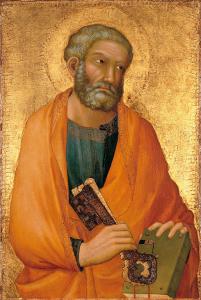Rev. Dr. Jordan B. Cooper is a Lutheran pastor, adjunct professor of Systematic Theology, Executive Director of the popular Just & Sinner YouTube channel, and the President of the American Lutheran Theological Seminary (which holds to a doctrinally traditional Lutheranism, similar to the Lutheran Church – Missouri Synod). He has authored several books, as well as theological articles in a variety of publications. All my Bible citations are from RSV, unless otherwise indicated. Jordan’s words will be in blue.
This is my 9th reply to Jordan (many more to come, because I want to interact with the best, most informed Protestant opponents). All of these respectful critiques can be found in the “Replies to Jordan Cooper” section of my Lutheranism web page.
*****
This is a response to Jordan’s YouTube video, “Did Jesus Found the Roman Catholic Church?” (5-13-19).
0:00 Someone else asked me to interact with the the claim that often shows up popularly among Roman Catholics: that their founder is Jesus Christ and our founder is Martin Luther. So they were founded by Jesus himself and we were founded by just some guy in the 16th century.
First of all, it is historical fact that Lutheranism was founded by Martin Luther (a mere monk with no inherent Church-wide authority) in either 1517 (when he posted his 95 Theses) or 1521 (Diet of Worms and his excommunication). It’s historically identifiable. Now, Jordan and Lutherans will quickly point out that Luther didn’t claiming to be a starting new Church, but merely reforming the existing one (hence the biased title of the revolutionary movement: “Protestant Reformation”). Jordan confirms this at 6:49: “the view of Lutheranism is not that Martin Luther started a new church. . . . it was a claim that the church had corruption in it that need[ed] to be dealt with.”
I understand that this is the claim made. But the changes were so many that it can hardly be considered merely a “variant” or “revised / reformed version” of what went before. Though still Christian and in agreement with Catholicism on many counts, it was radically novel in many ways, and Lutherans themselves claim to have restored the true gospel and the (supposedly hidden and suppressed) Bible and to have highlighted faith alone (soteriology) and Scripture alone (rule of faith and authority), even grace alone (as if we ever denied that!).
In fact, I note in one of my papers that Luther had rejected no less than fifty Catholic doctrines or practices by 1520. Protestant scholars McGrath, Geisler, and Schaff all confess that “faith alone” in the Lutheran sense was nonexistent from Paul to Luther (and I contend that St. Paul didn’t teach it, either). Therefore, it was a novel innovation in theology and history, not a “reform” (going back to what supposedly was). It was the same with sola Scriptura: where no Church father can be proven to have believed it. I have massively documented this myself (see my Fathers of the Church web page; search “sola Scriptura“). These are the two “pillars of the Reformation” — yet both are nonexistent in the Church fathers. The best they can come up with are scores of fathers saying that the Bible is wonderful and inspired and unique: which of course, no Catholic ever disagreed with.
Catholicism, on the other hand, is like a person tracing himself back to his conception in his mother’s womb. There is no logical or plausible starting-point except for Jesus’ commission to St. Peter:
Matthew 16:16-19 Simon Peter replied, “You are the Christ, the Son of the living God.” [17] And Jesus answered him, “Blessed are you, Simon Bar-Jona! For flesh and blood has not revealed this to you, but my Father who is in heaven. [18] And I tell you, you are Peter, and on this rock I will build my church, and the powers of death shall not prevail against it. [19] I will give you the keys of the kingdom of heaven, and whatever you bind on earth shall be bound in heaven, and whatever you loose on earth shall be loosed in heaven.”
Peter is presented as the leader of the disciples and of the early Church in the Bible. He is the key figure in the first council of the Church in Jerusalem (Acts 15), where a decree was made, guided by the Holy Spirit (Acts 15:28), which was then decreed far and wide by no less than the Apostle Paul (Acts 16:4). After Peter, we know of a succession of the bishops of Rome, which is well-attested in early Church fathers. Thus, if Jesus began His Church with Peter as leader, then it follows straightforwardly that if there is an unbroken succession of popes from Peter till now, that the Catholic Church was founded by Jesus. Protestants, of course, have various ways to try to evade this conclusion, but none of them are successful or even plausible as an alternative.
0:40 you’re presuming that Jesus created the Catholic Church not just the Catholic Church, but the Roman Catholic Church
Yes we are, for the biblical and historical reasons summarized above. There is an entity called “My Church” by our Lord Jesus Himself. It means something. It’s not mere some dreamy, ethereal, invisible, abstract thing, but institutional and historical and geographical: in space and time. Peter was the first leader. He went to Rome and became the bishop there, and Paul went to Rome, too. Both were martyred. Rome became the center of the Church — starting with those events (the two leading apostles ending up and being martyred there) — by God’s design, since it was the center of the political and cultural world at that time. It was to be “baptized” and made the Christian center of operations rather than the pagan one.
Protestants play games by always calling us “Roman Catholic”. This started with the Anglicans, as I understand it, so they could remove the pope and still act as if they were “Catholic”. Protestants try to make it provincial (centered at Rome, as if it is merely local), whereas it is in fact universal (the Church of the entire world led by the Roman See and bishop). The leader had to be somewhere, and in God’s providence that place was Rome.
0:46 obviously if I accepted that Jesus Christ founded the Roman Catholic Church specifically, then I would be a Roman Catholic.
Yes, that’s the point. So since Jordan doesn’t want to be a Catholic, he has to come up with a way to contend that Jesus didn’t found the Catholic Church, and argue that someone else did. Usually the theories are that it was Constantine (4th century) , or Pope St. Leo the Great (5th century) or Pope St. Gregory the Great (6th century). Some actually trace the present Catholic Church to the Council of Trent (16th century), claiming that it “anathematized the Gospel” and placed Catholicism outside of Christianity altogether.
The less ecumenical Orthodox claim that Catholicism ceased being the one true Church — or the western part of it — in the 11th century, when they decided to split off and go their own way. They discarded ecumenical councils, which they had previously agreed with, and all Protestants followed. Anglicans cast off the pope, which they had previously accepted also, and all Protestants followed that lead, too. Catholicism continues with both the papacy and ecumenical councils, just as it had always been in the first 1000 years of the Christian Catholic Church (another two arguments for our unbroken historical continuity). We’ll see what tack Jordan tries. I am answering as I read (my usual custom) so I don’t yet know what he’s gonna argue.
1:02 to argue that Jesus is the founder of the Roman Catholic Church is to argue that Jesus appointed Peter as the first pope
At the very least he was clearly intended to be the leader of the new Church, of which he was even said to be the foundation (“Rock”). Whether one wants to call that a pope or not is up to them. But if it walks like a duck, smells like a duck . . . Protestant T. W. Manson, in his book, The sayings of Jesus: as recorded in the Gospels according to St. Matthew and St. Luke (London: SCM Press, 1949) stated that Peter was by Jesus’ words intended to be “God’s vicegerent . . . The authority of Peter is an authority to declare what is right and wrong for the Christian community. His decisions will be confirmed by God” (1954 ed., p. 205). That sounds pretty “papal,” doesn’t it? Yet it’s a commentary from a Protestant on the New Testament text (words of Jesus). Here are what other Protestants say, along similar lines:
The great scholar F. F. Bruce stated that “in the new community which Jesus was about to build, Peter would be, so to speak, chief steward” (The Hard Sayings of Jesus [Downers Grove, Illinois: Intervarsity, 1983], 143-144).
Craig S. Keener wrote: “The image of keys (plural) perhaps suggests not so much the porter, who controls admission to the house, as the steward, who regulates its administration / probably refers primarily to a legislative authority in the church” (The IVP Bible Background Commentary New Testament [Downer’s Grove, Illinois: Intervarsity Press, 1993], 256, 90).
R. T. France, widely considered to be one of the best NT exegetes, stated: “Not only is Peter to have a leading role, but this role involves a daunting degree of authority . . . The image of ‘keys’ (plural) perhaps suggests . . . the steward, who regulates its [the house’s] administration . . . an authority derived from a ‘delegation’ of God’s sovereignty” (Vol. 1: Matthew, in Leon Morris, General Editor., Tyndale New Testament Commentaries, Leicester, England: Inter-Varsity Press/Grand Rapids, Michigan: Eerdmans Pub. Co., 1985, 256).
Lutheran Oscar Cullman described Peter as the “administrator of the house” (Peter: Disciple, Apostle, Martyr, translated by Floyd V. Filson, [Philadelphia: Westminster, 1953], 203).
Why would there be a leader of the Church only for the lifetime of Peter? No one ever thinks like that about other offices of leadership. If a country is a monarchy, it has a succession of kings. We have a succession of Presidents in America. No one would think in 1789 that we should have George Washington to be our one and only President and then we would no longer need a President at all. Sports teams have successions of coaches. Corporations have a succession of CEOs, cities have mayors, schools have principals, etc. The offices or positions don’t simply end.
Yet when it comes to the papacy, people think like that. It’s absurd from common sense and analogy alone, but we also have biblical data that expressly contradicts it. Protestants even acknowledge other biblical Church offices of leadership that continue (pastors and deacons, and in some cases, bishops), yet they balk at accepting even a theoretical notion of a papal succession.
2 Timothy 2:1-2 You then, my son, be strong in the grace that is in Christ Jesus, [2] and what you have heard from me before many witnesses entrust to faithful men who will be able to teach others also.
St. Irenaeus (130-202) wrote:
The blessed apostles, then, having founded and built up the Church, committed into the hands of Linus the office of the episcopate. Of this Linus [start of reign: 64-68], Paul makes mention in the Epistles to Timothy [2 Tim 4:21]. To him succeeded Anacletus [r. c. 79 – c. 92]; and after him, in the third place from the apostles, Clement [r. 88-99] was allotted the bishopric. . . . To this Clement there succeeded Evaristus [r. c. 99 – c. 107]. Alexander [r. c. 107 – c. 115] followed Evaristus; then, sixth from the apostles, Sixtus [r. c. 115 – c. 124] was appointed; after him, Telephorus [or, Telesphorus; c. 126 – c. 137], who was gloriously martyred; then Hyginus [r. c. 136 – c. 142]; after him, Pius [r. c. 140 – c. 154]; then after him, Anicetus [r. c. 157- c. 168]. Soter having succeeded Anicetus, Eleutherius [r. c. 174-189] does now, in the twelfth place from the apostles, hold the inheritance of the episcopate. In this order, and by this succession, the ecclesiastical tradition from the apostles, and the preaching of the truth, have come down to us. And this is most abundant proof that there is one and the same vivifying faith, which has been preserved in the Church from the apostles until now, and handed down in truth. (Against Heresies, Bk III, 3, 3; my own links in the text; cited in Eusebius, Ecclesiastical History, Bk V, 6, 1-5)
2:13 I think that as Christians we all can look at the early church and say this is our heritage, which is why we can have a kind of unity over certain things like confessing the early Creeds of the church, and we we can find common ground in the early church fathers that we all claim
Exactly! So Jordan now needs to tell us what this early Church is, and how and where it began. He refers to it, so I assume he must have some conception in his mind of its nature and origin. The Church fathers were real people; likewise, the Church that they constantly referred to was a real thing with an origin in actual history.
2:40 I don’t make claims that the early church was the Lutheran Church. I don’t make claims that the early church was that Roman
*
***
*
Practical Matters: Perhaps some of my 4,500+ free online articles (the most comprehensive “one-stop” Catholic apologetics site) or fifty-five books have helped you (by God’s grace) to decide to become Catholic or to return to the Church, or better understand some doctrines and why we believe them.
Or you may believe my work is worthy to support for the purpose of apologetics and evangelism in general. If so, please seriously consider a much-needed financial contribution. I’m always in need of more funds: especially monthly support. “The laborer is worthy of his wages” (1 Tim 5:18, NKJV). 1 December 2021 was my 20th anniversary as a full-time Catholic apologist, and February 2022 marked the 25th anniversary of my blog.
PayPal donations are the easiest: just send to my email address: [email protected]. Here’s also a second page to get to PayPal. You’ll see the term “Catholic Used Book Service”, which is my old side-business. To learn about the different methods of contributing (including Zelle), see my page: About Catholic Apologist Dave Armstrong / Donation Information. Thanks a million from the bottom of my heart!
*
***
Photo credit: St. Peter (1326), by Simone Martini (1285-1344) [public domain / Wikimedia Commons]
Summary: Lutheran apologist Jordan Cooper makes rather basic objections to the notion of the Catholic Church being founded by Christ. I go in-depth from the Bible & history.














